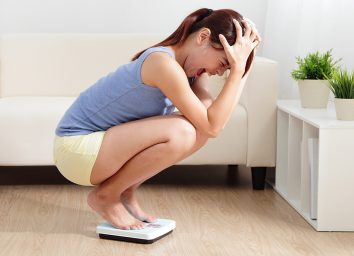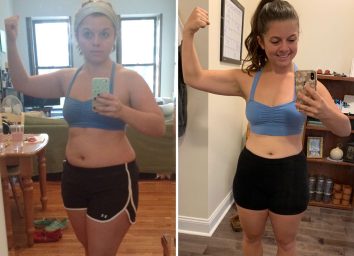Top 10 Rules You Must Follow Every Day to Lose 10 Pounds
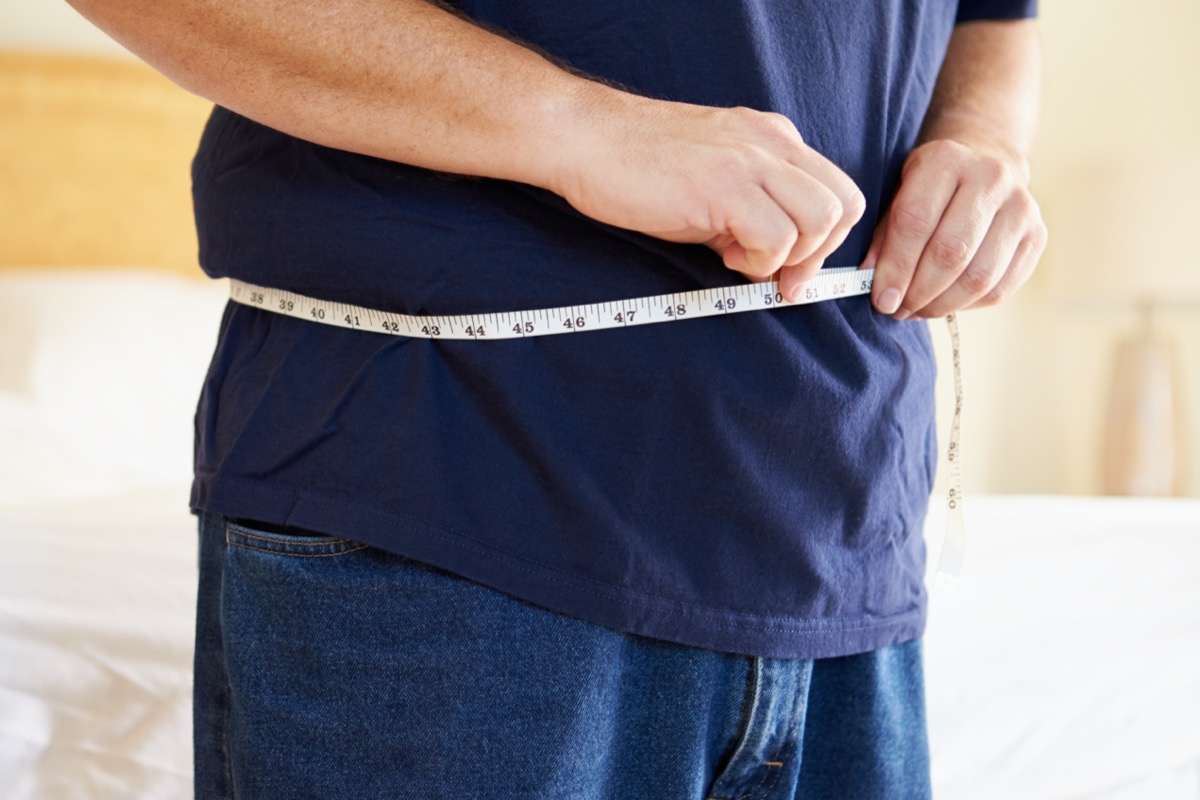
Experts say the key to losing weight—and actually keeping off the weight—isn’t a crash diet or starving yourself. Rather, it’s making long-term lifestyle changes that include eating healthy foods and engaging in fit-friendly activities you genuinely enjoy. And because the most successful slim down stems from a long, steady process, you certainly have time to try out the thousands of weight loss tips out there to see if they work for you. However, the most effective route is committing to and building new habits that set you up for success.
So, to help you reach your toned body goals, we’ve gathered the 10 most critical (but easiest!) diet and fitness tips that are proven to show results. Their simplicity allows them to be realistically implemented every day so they can seamlessly fit into your routine. And their effectiveness will allow you to start seeing results immediately, providing you with positive reinforcement to continue along your weight loss journey.
Commit to these tips, and you’ll finally start seeing the scale tip in your favor. What’s even better? Once these healthy habits become ingrained in your brain, they’ll ensure you maintain your trimmer figure, and knowing which healthy foods to keep stocked will be easier than ever!
Carry a reusable water bottle everywhere.
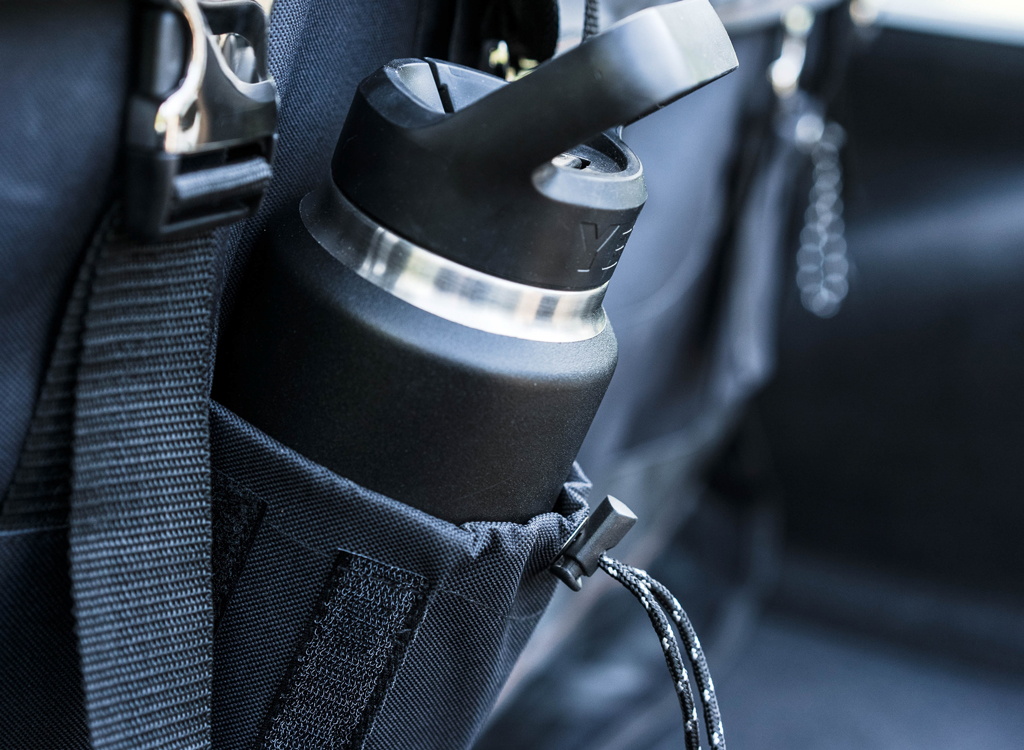
Hydration is a dieter’s best friend. Why? Because water helps stave off overeating, keeps your metabolism humming, reduces bloat, and saves you hundreds of calories when you choose it over other sugary drinks. We often mistake thirst as hunger, so just drinking some water and waiting 20 minutes can fill up your stomach and might subside your appetite, keeping you from overeating when your body doesn’t need food to fuel. Secondly, this liquid is vital to many important metabolic processes, including cellular energy production and assisting your body in metabolizing stored fat; when your body is dehydrated, it’s functioning at a deficit, and won’t be able to optimize your weight-loss efforts.
Additionally—and it might sound counterintuitive—but sipping on H2O can actually help rid your body of excess water retention. Without drinking enough water, your body holds onto every drop to prevent severe dehydration. Last, but not least: Did you know the average American drinks 140 sugar-loaded calories a day? If you replaced all of that with water, you could drop more than 10 pounds over the course of a year! According to one study of 173 overweight women, those who added 4 cups of water to their daily diets lost five extra pounds over the course of a year! And when two of those cups were timed before eating each meal, researchers found that those subjects lost 30 percent more body fat in just 12 weeks.
Eat This! Tip: The easiest way to ensure you’re getting enough water is by always carrying a water bottle with you. You can even make it a fashionable one, too! Try our favorite: the stainless-steel, double-wall-insulated, BPA-free bottle from S’well. It’ll keep your detox water cold for 24 hours (and your green tea hot for 12) without any of those nasty hormone-disrupting chemicals which get in the way of efficient weight loss and better health!
Keep a consistent sleep schedule.

Rise and shine! Studies have found that dieters who stick to the same sleep-wake cycles are more rested and less apt to have their diets undermined by exhaustion-induced munchies. That’s because researchers discovered that when you shift your bedtime and wake times daily, you can succumb to a case of chronic jet lag. So, even if you get enough sleep (7 to 8 hours a night!), you can confuse your metabolism enough to promote weight gain if it’s on a flipped schedule. And when you’re suffering from fatigue, your body struggles to regulate its hunger hormones and “endocannabinoids,” which ultimately tell your brain to indulge in fatty, high-energy foods—even if your body isn’t physically hungry.
Eat This! Tip: According to researchers, sleep-deprived people consume about 385 more calories a day—which adds up to an extra 15 pounds a year—than their well-rested counterparts. Set an alarm clock for the same time each day, even on weekends or days off. It’ll help you sleep better by maintaining your body’s internal clock. And if you have trouble getting that shut-eye, try establishing bedtime routines which can condition your body to feel sleepy. Always take a shower, sip a cup of herbal tea, or read a couple pages from that new book—whatever it is, you can train your body to associate that activity with sleeping. And when it comes to the fridge, check out these 30 Best and Worst Foods To Eat Before Sleep.
Prep and prioritize produce.
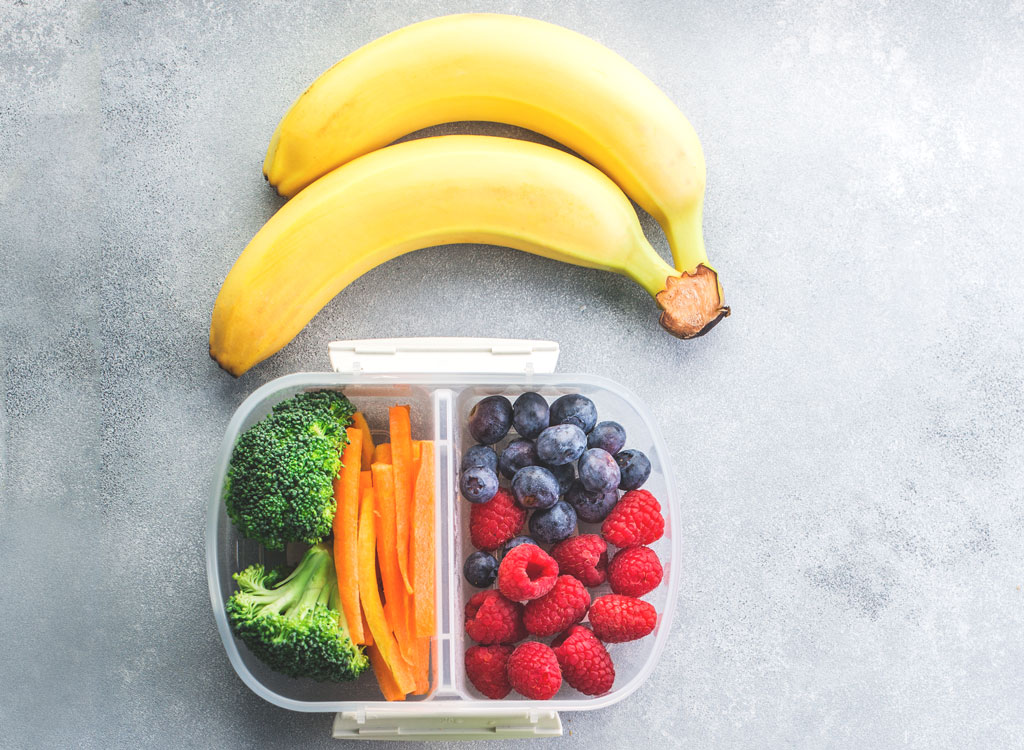
The first step of successful weight loss is manipulating your environment to make it hard to fail. One of the best ways to do that is removing all temptations from your kitchen and replacing them with healthy foods—in particular, fresh fruits and vegetables. Hitting the recommended five to nine daily servings of fruits and veggies can make it easier to slim down, according to research. That’s because nature’s bounty is full of free-radical fighting antioxidants that have been found to accelerate weight loss and maintain health—and the average American isn’t eating enough of them. What’s more, when you eat more veggies and legumes, you can start displacing saturated-fat-laden meats, which have been known to contribute to inflammation and stunt weight loss efforts.
Eat This! Tip: To up your antioxidant intake, keep fruit in a bowl on a counter near your keys and stock chopped up veggies in to-go containers to grab on your way out of the house. Eschew meat all day on Mondays or just every day before dinner. But make sure you’re not just subbing out meat for empty carbs, which will only stoke your hunger and may erase any weight-loss progress.
Walk at work.

Attention, workaholics and weekend warriors! Experts say all this sitting we do at work can lead to an increased risk of heart disease and cancer, as well as early death—and that’s regardless of whether you still carve out time to exercise. On the other hand, studies published in the journals Diabetes Care and BMJ discovered that when middle-aged overweight and obese adults interrupted traditionally long periods of sitting with short bouts of walking every 30 minutes, they lowered self-reported fatigue, minimized spikes in blood-sugar, and lowered post-meal insulin levels. And because insulin is the major hormone responsible for stored fat, being able to decrease its levels (along with your blood sugar) can help keep your body goals on track and keep your hunger pangs at bay.
Eat This! Tip: Set a timer to simply get up from your desk and take a one-minute walk once every half an hour. For an 8 hour work day, walking 1 minute every 30 minutes is 16 minutes walking. So in a 5-day week, this translates to adding just 80 minutes of walking to your routine, which could help you lose about 6 pounds a year and keep your body healthy and your waistline trim.
Eliminate empty carbs.
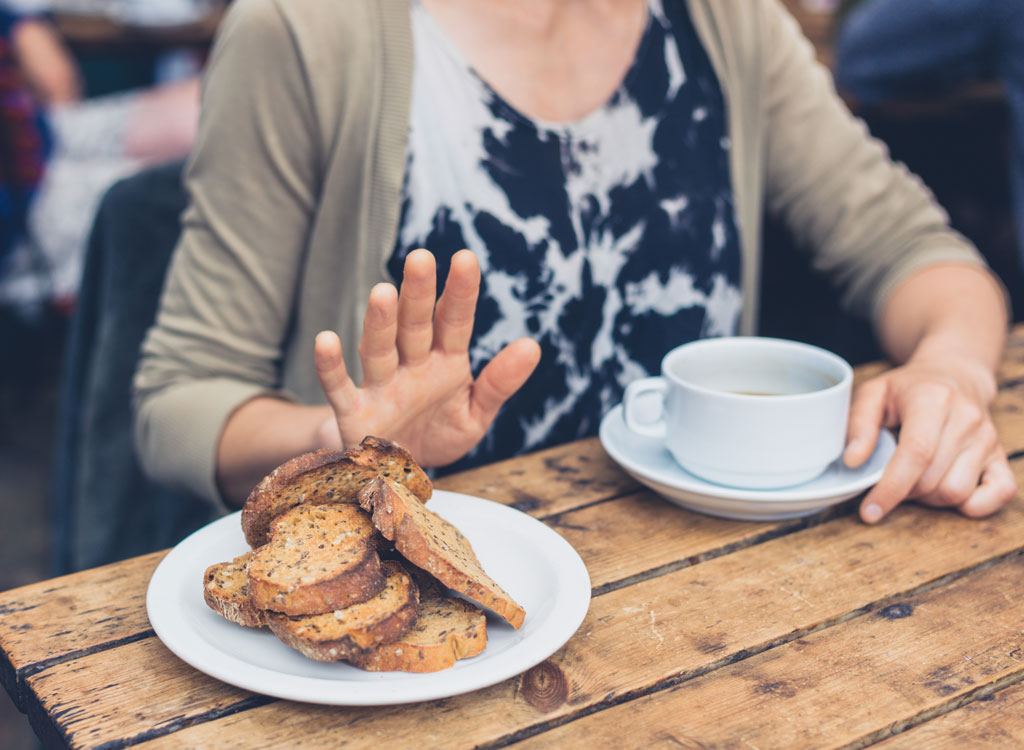
While many diets begin by having you eat less, we prefer you just eat less of the wrong foods. Eating the wrong foods day in and day out—even on a calorie-controlled diet—may not cause weight gain, but it can prevent weight loss. That’s because your body burns all of its fast carbs and sugars before it can burn stored fat. So, if you start to eliminate empty sources of carbs from your diet like white bread, cookies, and sugary drinks, and replace them with their whole-grain version, you’ll be able to reap some of the health benefits without feeling like you’re depriving yourself.
Eat This! Tip: If you don’t know where to start, look no further than these 30 Easy Ways to Stop Eating So Much Sugar. One of our top tips is listed below!
Cook at home.

According to a study published in BMJ Open, additive-laden, ultra-processed frankenfoods account for 90 percent of the added sugar we consume. That’s not even the worst of it. Recent stats revealed that Americans dine out between four and five times a week—which is bad news for your belly when you realize the average sit-down meal contains a staggering 1,128 calories. For those reasons, eschewing processed foods by cooking at home can cut out 346 calories from sugar alone and 226 calories every time you eat out. Doing this just four times a week saves you 572 calories a week or 17 pounds a year.
Eat This! Tip: Save money and calories by bringing lunch to work every day and carrying homemade snacks instead of picking up energy-dense junk from the store. Check out how much sugar you’d save by swapping these ultra-processed foods for homemade versions.
Eat balanced meals.
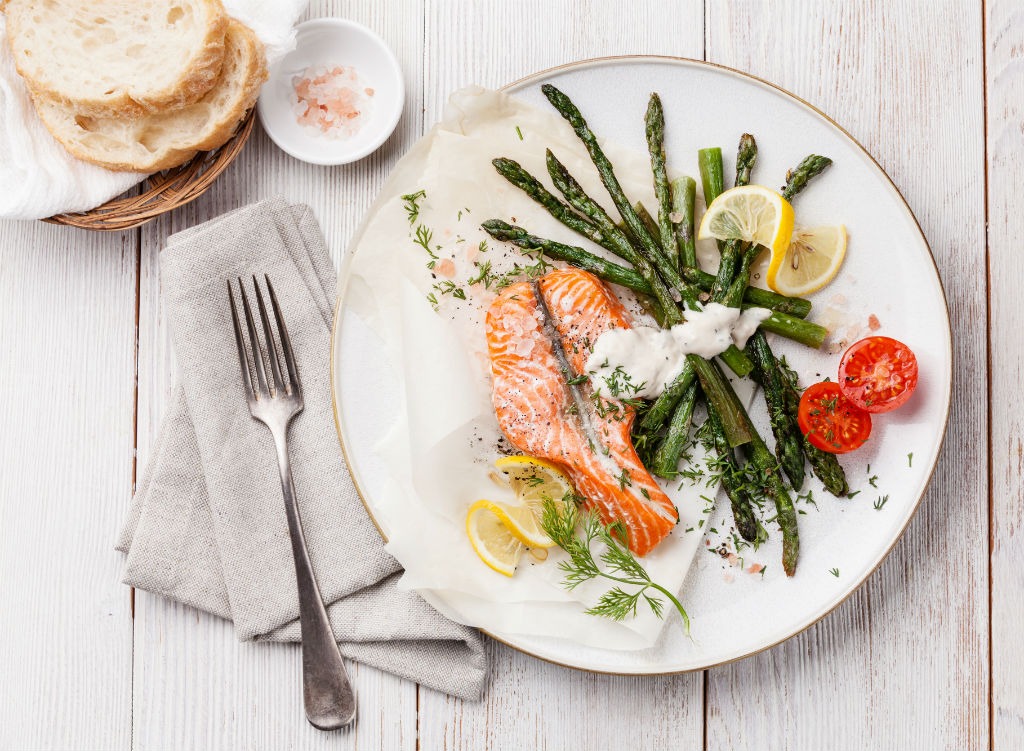
Before every meal, ask yourself, “Where’s my protein, where’s my fiber, and where are my healthy fats?” It’s the key mantra of the Zero Belly Diet by Dave Zinczenko. Why is that? Most Americans are not eating too many carbs; they’re just eating too many of the wrong carbs: the simple ones. These high-calorie, non-nutritious foods burn up quickly in your body, which spikes your blood sugar and then causes it to crash. The result? Low glucose levels trigger your hunger hormones. Make the most out of the calories you are eating on your diet by cutting out high-calorie, low-value foods like sweets and refined grains. Then, replace them with high-fiber whole grains and vegetables, foods rich in protein, and plant oils full of healthy fats. This trio of protein, fiber, and healthy fats will keep your energy levels stable and your belly full, helping to curb overeating.
- Protein: A study in the journal Nutrition Metabolism found that when participants increased their protein intake to just 30 percent of their overall diet, the dieters ate roughly 450 fewer calories a day than those who ate less protein—amounting to losing an average of 11 pounds over the course of just 12 weeks. What’s protein’s waist-whittling magic? This macronutrient increases calorie-burning lean muscle mass, which keeps your metabolism running at its peak—even resting. Like fiber and fat, protein digests slowly, which keeps you full and makes you less likely to overeat. To maximize your health and weight-loss, aim to include protein in all of your meals and snacks. The best options? Lean protein sources like fish, eggs, legumes, low-fat dairy, and lean meat.
- Fiber: Because of a diet full of unhealthy fats and simple carbs, most Americans don’t eat enough fiber—and it has some seriously negative effects. For starters, not eating enough fiber may cause constipation, which then leads to bloating and weight retention. On the other hand, eating fiber-rich meals will help usher toxins out of your system and help keep blood sugar at even levels to keep your hunger pangs at bay. Plus, fiber-rich foods are the best source of food for our gut bugs. Feeding your gut these prebiotics will help with the production of fat-fighting, anti-inflammatory compounds.
- Healthy Fats: Eating the right healthy fats won’t just keep you full, they can also help torch fat. Polyunsaturated fats known as omega-3s help reduce inflammation, control hunger, turn off your fat-storage genes, and control blood sugar—a recipe for banishing that muffin top. Their anti-inflammatory properties have also been shown to counteract the brain-damaging effects a high-sugar diet has on the brain, which includes an increased risk of degenerative diseases such as Alzheimer’s.
Eat This! Tip: Just because you’re cutting calories doesn’t mean you should always be at the mercy of hunger pangs. Here are here are 26 Ways to Feel Full While You’re Eating Less, including ways to reign in your appetite, which foods to cut from your diet, and which to replace them with to prolong feelings of fullness and suppress your hunger pangs.
Maintain a consistent menu.
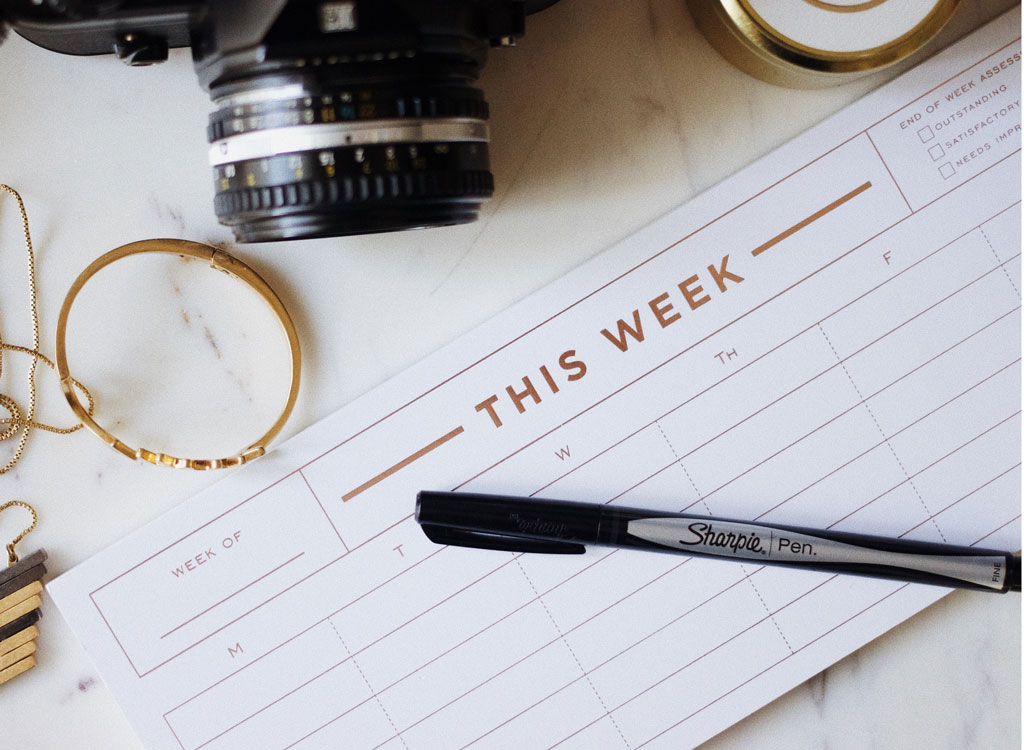
Variety is the spice of life, but it’s a habit-breaker when it comes to weight loss. Even worse, trying to figure out what you’re going to make that night day in and day out can be a pain—and will certainly drain your willpower tank. Meal planning is one of the best ways to help you gain control of your overall food intake. The most successful dieters work with a rotation of just a few go-to meals and snacks—because when you’re tummy is rumbling, trying to figure out what you should eat typically doesn’t end well. Make a point of prepping your meals and snacks in advance so you can always have ready-to-eat healthy foods with you. It’s going to be far more difficult to eat a healthier diet and fit in exercise if you’re too busy thinking about what you should be eating, which could end up being greasy take-out.
Eat This! Tip: Have a few go-to meals you eat on a consistent basis. That way, you can conserve your willpower for more important decisions. You can even create a meal plan formula by designating a theme for each day: Meatless Monday, Taco Tuesday, Stir-Fry Friday, Crockpot Saturday. That way, you won’t get bored of eating the same exact meals every week, but you’ll still maintain guidelines to keep it easy to decide what to cook. To get you started, check out our Realistic Flat-Belly Meal Plan for a Healthy Week. (Psst! We even reuse leftovers!)
Keep healthy snacks on hand.

Yes, you can snack and still lose weight! In fact, munching on the right kinds of foods throughout the day is one of the best ways to shrink what might seem to be your ever-expanding waistline. A recent study discovered that participants lost significantly more body weight when they incorporated low-sugar, high-protein snacks into their daily food routine. Why? Fitting in healthy snacks can help maintain your blood-sugar levels, which keeps you full and prevents your body from storing excess fat or indulging in high-energy foods after what feels like starvation.
Eat This! Tip: When looking for a healthy snack, it should be around 130 to 250 calories and be full of healthy, satiating fats, protein, fiber, and energy-providing carbs. Consider hummus and veggies, yogurt with fruit and granola, or a peanut butter and jelly sandwich on whole wheat toast. Start with these 50 Best Snacks for Weight-Loss if you need even more inspo.
Eat with intention.

Consider this: You double-check sites for hotel reviews, but you don’t bother to examine the nutrition label of a food that literally fuels your body. Most of the time, we completely overlook the importance food plays in our daily lives. And that’s undermined even more when it comes to how we eat it—like reaching over to the passenger’s seat to grab another chip as you drive your kids to soccer practice or placing a microwaved dish on your protruding belly as you recline to watch the big game. Both of these are instances of distracted eating, which can prevent satiety signals from reaching our brains in regular time. As a result, researchers have discovered that people consume hundreds of extra calories when distracted as opposed to focused on their food.
Eat This! Tip: Make an effort to eat family meals at a table. Or, step away from your desk for lunch and sit in a cafe. Removing yourself from distractions and work to put yourself in an environment that consistently means, “It’s time to eat,” will allow you to more mindfully focus on eating. That way, you won’t be irrationally snacking while you’re on the couch or blindly chowing down as you finish a project. And by all means, take your time! Scarfing down meals in under 20 minutes can leave you unsatisfied because it takes just as long for hunger hormones to relay the message to your brain you’ve eaten your fill.
